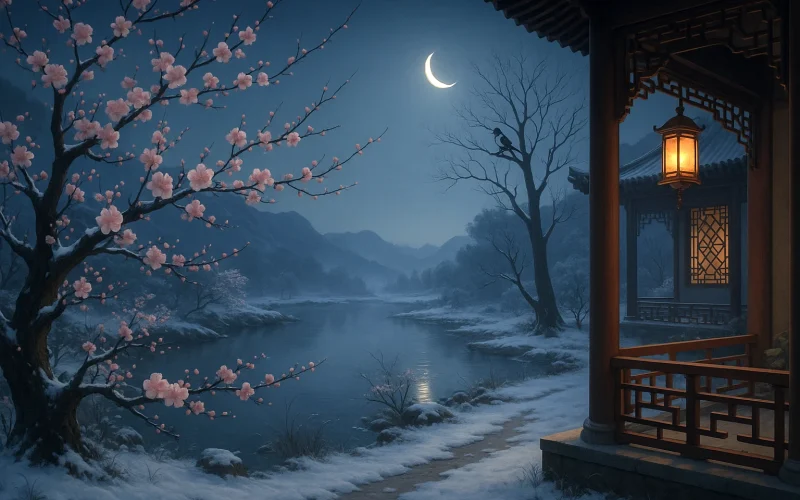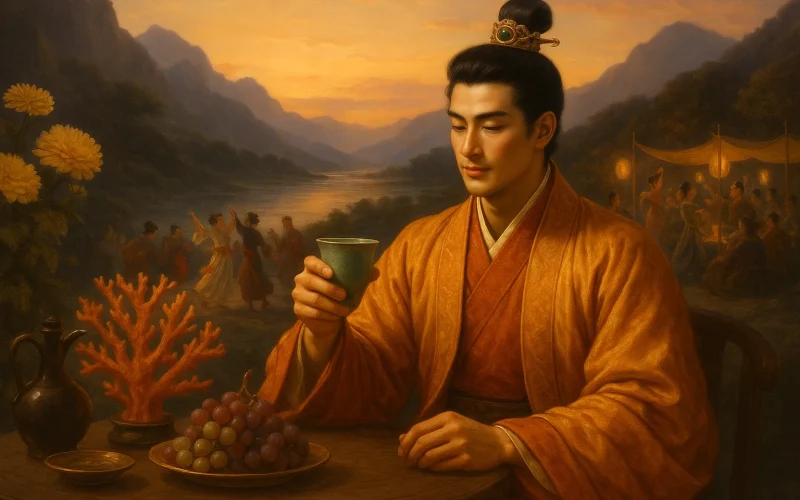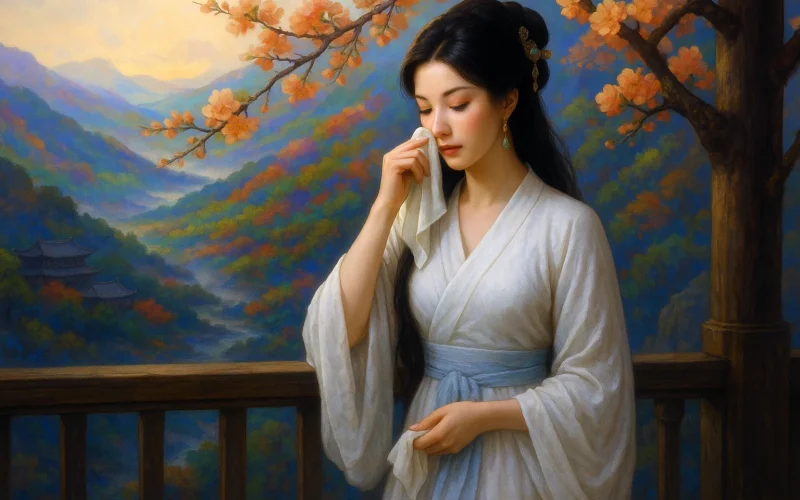The garden’s snow—a corpse of spring,
Yet by black pool, defiant mumes dare to sting.
Gaunt trees host magpies’ skeletal nests,
The sick moon bleaches grass to death’s behest.
Fair Jinling’s hills mock mortal decay—
Boys turn to dust while sceneries stay.
Drain! Drain! gold cups ere shadows sever!
Joy’s a phantom—partings last forever.
Original Poem
「醉花间 · 晴雪小园春未到」
晴雪小园春未到,池边梅自早。
高树鹊衔巢,斜月明寒草。山川风景好,自古金陵道,少年看却老。
冯延巳
相逢莫厌醉金杯,别离多,欢会少。
Interpretation
This ci by Feng Yansi, a leading poet of the Southern Tang period alongside Li Yu, exemplifies his mastery of lyrical melancholy and subtle emotional resonance. Composed during early spring, the poem weaves together garden scenes, plum blossoms, and moonlight to create an atmosphere of quiet solitude tinged with nostalgia. Through its delicate interplay of imagery and sentiment, the work reflects on the transience of youth and the fleeting nature of human connections, embodying the quintessential wanyue (graceful restraint) aesthetic.
First Stanza: "晴雪小园春未到,池边梅自早。高树鹊衔巢,斜月明寒草。"
Qíng xuě xiǎo yuán chūn wèi dào, chí biān méi zì zǎo. Gāo shù què xián cháo, xié yuè míng hán cǎo.
Sunlit snow lingers—spring hesitates at my small garden's edge,
yet by the pond, plum blossoms brave the cold alone.
High in the trees, magpies gather twigs for nests,
while the waning moon bathes frost-stricken grass in pallid light.
The stanza constructs a vivid early spring tableau. "Sunlit snow" (晴雪) and "hesitant spring" (春未到) establish a transitional season where winter's grip loosens reluctantly. The precocious plum blossoms (梅自早), flowering defiantly by the pond, symbolize resilience amid adversity—perhaps mirroring the poet's own steadfastness during Southern Tang's political winters. The magpies' nest-building (鹊衔巢) introduces a note of renewal, juxtaposed against the "waning moon" (斜月) illuminating frostbitten grass—a poignant metaphor for life's simultaneous persistence and fragility.
Second Stanza: "山川风景好,自古金陵道,少年看却老。相逢莫厌醉金杯,别离多,欢会少。"
Shān chuān fēng jǐng hǎo, zì gǔ Jīnlíng dào, shào nián kàn què lǎo. Xiāng féng mò yàn zuì jīn bēi, bié lí duō, huān huì shǎo.
These mountains and rivers remain fair—
along Jinling's eternal roads,
the boy who once gazed now stands aged.
When we meet, never refuse golden cups of wine:
partings crowd our days,
while joyous meetings scatter few and far between.
Transitioning from observation to meditation, the stanza reveals Feng's philosophical depth. The enduring beauty of Jinling's landscapes (金陵道) contrasts sharply with human ephemerality—"the boy now aged" (少年看却老) encapsulates life's swift passage in five stark characters. The concluding triad delivers a carpe diem exhortation: "never refuse golden cups" (莫厌醉金杯) becomes an antidote to life's inherent separations. The asymmetrical final couplet—"partings crowd our days,/while joyous meetings scatter few"—rings with the uneven rhythm of lived experience, where sorrow outweighs joy.
Holistic Appreciation
The poem opens with the crisp chill of early spring—plum blossoms blooming ahead of season, frost-touched grass beneath a slanting moon—painting a scene both austere and poetic. The first stanza focuses on scenery, embedding emotion within the landscape; the second shifts from scene to sentiment, weaving reflection into feeling, as the "road to Jinling" prompts sighs over life’s impermanence and brevity.
Feng Yansi excels at capturing mood with concise yet delicate strokes. Here, he uses desolate, icy imagery to subtly contrast inner melancholy. The second stanza evolves from lamenting lost youth to philosophical musing, embracing "seize the day" wisdom—echoing the Tang spirit of "when life delights, drink your fill," but with the introspective subtlety characteristic of Southern Tang poets.
Artistic Merits
- Emotion Hidden in Scenery, Natural Undulation
Depictions of "early spring" and "lingering cold" seamlessly embed the poet’s solitude, gently leading to meditations on life’s fleetingness. - Lyrical Language, Scene and Sentiment Fused
Feng’s diction is refined and understated, layering meaning into tangible imagery. The poem’s elegance resonates beyond its words, lingering without overt declaration. - Compact Rhythm, Fluid Transitions
Shifting from scenery to emotion, from nature’s chill to life’s impermanence, the pace quickens organically, enriching the poem’s layered depth.
Insights
Beyond an acute sensitivity to nature, this ci offers profound reflections on human existence. The turn from "spring not yet arrived" to "youth glimpsed then aged" whispers a truth: life slips away in waiting; youth fades unnoticed. Before landscapes once stirring, we may return yearly only to find "scenes unchanged, people gone."
The line "When we meet, don’t scorn drunken golden cups" transcends mere toast—it’s a response to life’s brevity and unpredictability. Facing time’s inexorable flow, we can only cherish the present, treat others sincerely, and embrace each gathering wholeheartedly. Feng Yansi’s melancholy, veiled in wintry scenes and lyrical restraint, reveals life’s fragility through artful fusion of feeling and philosophy, scene and thought—a poetic wisdom still vital in our hurried modern lives.
About the Poet

Feng Yansi (冯延巳 903 - 960), courtesy name Zhengzhong, was a native of Guangling (modern-day Yangzhou, Jiangsu) and a renowned ci poet of the Southern Tang during the Five Dynasties and Ten Kingdoms period. Rising to the position of Left Vice Director of the Department of State Affairs (Zuo Puye Tongping Zhangshi), he enjoyed the deep trust of Emperor Li Jing. His ci poetry forged a new path beyond the Huajian tradition, directly influencing later masters like Yan Shu and Ouyang Xiu, playing a pivotal role in the transition of ci from "entertainment for musicians" to "literary expression of scholar-officials."












